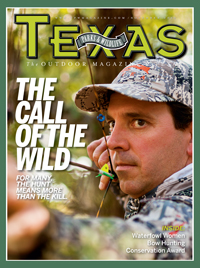
From the Pen of Carter P. Smith
There was dead silence on my end of the phone when Dr. Dee Ellis, the Texas state veterinarian, called to give me the news. Two mule deer, part of a larger sample of deer collected by department biologists and other partners in the furthest reaches of West Texas, had tested positive for chronic wasting disease (CWD). “Yes,” he quickly blurted out, anticipating my next question as to whether the results were indeed fully confirmed.
This development, while wholly unwelcome, was not entirely unexpected, either. Several months before, colleagues from New Mexico informed us that several mule deer from just across the state line in the Hueco Mountains had tested positive for CWD. Given the wide-ranging nature of mule deer movements and the lack of any physical barrier in that area, the results were something of a foregone conclusion.
If there was a silver lining in this discovery, it came from the fact that the infected animals were found in a remote part of the state, that we were not in the middle of deer season when it was discovered and that we can learn from the lessons of other states that have contended with CWD for decades, such as Colorado. In short, there was no need to panic.
Nevertheless, the news still stung. Deer are sacrosanct to hunters and landowners in the Lone Star State, and after years of doing everything imaginable to keep CWD out of the state’s deer herds, Texas became the 21st state with a known occurrence of the disease.
For the uninitiated, CWD is the deer equivalent of bovine spongiform encephalopathy in cattle or scrapie in sheep. A fatal neurological disease, CWD is caused by abnormal proteins called prions. Animals that contract the disease suffer a painful death marked by symptoms such as rapid weight loss, fatigue and general listlessness. While all the vectors for the spread of CWD are not fully understood, we do know that it can be transmitted through animal-to-animal contact and through the passage of fluids.
What does this mean for wildlife and hunters in far West Texas? As my colleague Steve Lightfoot writes in this issue, the most important responsibility is simply to get informed. For starters, CWD is not known to be transmitted to humans, and hunters in the area where CWD was discovered should take their usual precautions when handling, cleaning, processing and cooking their wild game. Animals that are obviously sick should not be harvested.
In addition, hunters should know that our biologists have been working closely with veterinarians from the Texas Animal Health Commission (TAHC) and the private sector, wildlife health professionals and deer managers to address this matter. With the aid of these key stakeholders, TPWD and TAHC have put in place a sensible and comprehensive plan that seeks to contain the possible spread of the disease. Among other things, actions such as establishing mandatory hunter check stations, enhancing disease monitoring and restricting the movement of live deer inside and outside of a proposed containment zone are all being contemplated.
CWD is another of the many complex natural resources issues our team of dedicated biologists and technicians must contend with on a daily basis in managing the state’s bountiful fish and wildlife populations. Whether battling the onslaught of giant salvinia or zebra mussels in inland lakes, researching new ways to control feral hog populations, contending with an outbreak of red tide along the coast or working to arrest the spread of a fatal deer disease, TPWD wildlife and fisheries staff work overtime to ensure our fish and wildlife populations stay healthy and vibrant for years to come. I am very proud of their work and hope you are, too.
Thanks for caring about our wild things and wild places. They need you now more than ever.
Related stories
Hunters' Help Is Sought in Combating Chronic Wasting Disease
For more articles on hunting, check out TP&W magazine's Hunting Page.

